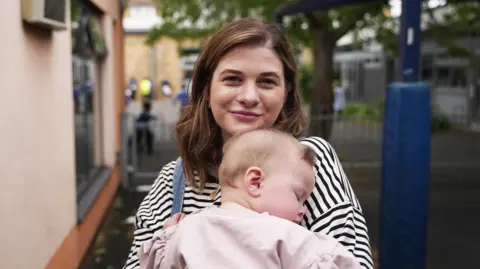A large three-year study has found that specially designed singing lessons are clinically effective in treating mothers with postpartum depression. The authors say they could also be cost-effective for the NHS at a time when mental health services are under pressure.
At a children's center on a housing estate in south London, a group of 12 young mothers sit in a circle on the floor as their babies cry, crawl and sleep on mats in front of them.
But in this music lesson there are no bells, no tambourines, no “Wheels on the Bus”, no “Shark”.
Instead, the group uses a mixture of lullabies, folk songs and gospel, switching between Spanish, Congolese and Swahili in four-part harmonies.
The entire session, from the choice of music to the size of the group and the equipment of the room itself, was carefully designed to treat the symptoms of postpartum depression.
“I can't stress enough how much of a game-changer this has been for me,” says Holly, 30, who started the course earlier this year after her care coordinator recommended it.
She says she started feeling unwell during her pregnancy after “my hormones went wrong or something went wrong.”
Although these symptoms began to improve after the birth of her daughter Etty, she still felt “vulnerable and very anxious”.
“Being a new mom is one of the loneliest times because you're kind of in this isolated bubble,” she says.
“And the very first session I walked in and thought, 'Oh, this is my safe place.' Like, I’m safe here.”

Postpartum depression is a common problem, affecting more than one in 10 women in the year after giving birth. according to the National Health Service.
Symptoms vary but may include persistent sadness or low mood, problems with self-care, insomnia, and withdrawal from other people.
Tunes for Mums began in 2017 as a free weekly class in Southwark, south London, based on earlier research that showed group singing could reduce stress and anxiety.
It has expanded rapidly and now provides face-to-face classes to 400 women a year across the five boroughs of London, as well as online classes across the UK.
“We know that women experiencing symptoms of postpartum depression have difficulty connecting with their peers,” says Yvonne Farquharson, founder of Breathe Arts Health Research, the nonprofit behind the idea.
“So through singing, we get them to really look at each other and make that connection and social connection.”
New mothers often join a program after being suggested by a midwife, GP or local authority, or finding it through social media or word of mouth.
Before starting the 10-week course, a test is carried out to ensure they will benefit.
“Long-lasting” effect
In 2019, the classes became part of a study funded by a £2.6 million Wellcome Trust grant to explore how local arts projects could improve physical and mental health on a wider scale.
The findings, published this week in the British Journal of Psychiatry, followed almost 200 mums with postpartum depression over eight months.
The women were divided into two groups: one group was assigned a singing course, while the other was offered more typical support, such as social play sessions.
All mothers reported a decrease in symptoms by week 10, but this improvement continued in the singing group for another six months after the end of classes.
“This is really important because it shows that singing not only effectively relieves depression, but also has long-term effects,” said Dr Rebecca Bind, a research fellow at King's College London and one of the lead authors of the study.
Women in the singing group also had significantly lower dropout rates and were more likely to say they felt the group suited their needs well and was easy to use.
The published article did not specifically examine why singing itself has beneficial effects. But researchers have their own theories.
“I think part of this was because the women were in the presence of other mothers who were going through the same experience, even if they didn't necessarily have to talk about it,” Dr. Bind says.
“And besides, the act of singing can have a very relaxing effect.”
In the second stage of the analysis, saliva swabs were already taken from the women to measure the level of the stress hormone cortisol.
According to Carmine Pariante, professor of biological psychiatry at King's College London, early results show that mothers in the singing group saw “a good sustained reduction in these levels throughout the intervention period.”
The music classes also helped mothers form a bond with their children that continued after the course as songs and music were used at home.

At the child care center, Jay, holding her baby son Ezra, describes postpartum depression as “feeling down when I know I should be at the happiest moment of my life.”
“Just being able to be with people who are also experiencing difficulties, although that is not the purpose of the session. [is important]”, she says.
“You’re here, you’re having a great time and you’re singing, but you know these people are going through the same thing as you.”
Long NHS waiting lists
Organizers emphasize that singing lessons should not replace talk therapy or medication.
But they could be either free or a faster, more affordable alternative for some women at a time when waits for NHS mental health care can be long.
Some mothers may wait up to six months for evaluation and up to a year for individualized treatment, according to the data. Maternal Mental Health Alliance 2024 report.
A study from King's College London found that the cost of a music course, ranging from £126 to £539 per mother and child depending on how it is measured, was comparable to alternatives such as educational programs and significantly lower than the cost of group therapy or home visits.
Breathe's Yvonne Farquharson says the arts organization has already run its first singing sessions aimed at new dads.
The World Health Organization also commissioned him to prepare teams to conduct classes in Denmark, Italy, Romania and other countries.
At a children's center in south London, the group talks not only about the friendships they made, but also about the skills they acquired over 10 weeks.
“I have two very young children, so it can be very stressful at home,” says Stella, holding squirming baby Evie tightly in her arms.
“I bring singing home with me, so now I start humming when things get tense and I don’t even think about it, it just happens and I can handle it.”
Examples of tracks “Melodies for Moms”:
- My baby was scared – Spanish lullaby
- Stand Crab – Swahili folk song
- Bele mama – Cameroonian folk song
- Yani Yoni Ya Hu Wey Hey – Native American birthing song
- A list of organizations in the UK offering support and information on some of the issues described in this story is available at: BBC Action Line









